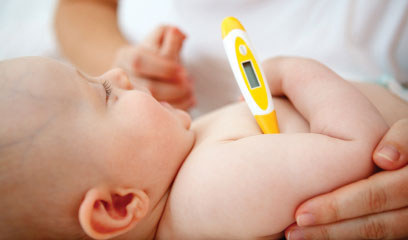 All parents have been there. It's the middle of the night and everyone is nestled all snug in their beds. First the cry comes. It is an irritable, desperate cry and it pulls at your heart. You go in to comfort your child and realize that she is hotter than normal. You feel her forehead and you know -- but, to be sure, you feel her tummy, legs and finally announce, "She has a fever."
All parents have been there. It's the middle of the night and everyone is nestled all snug in their beds. First the cry comes. It is an irritable, desperate cry and it pulls at your heart. You go in to comfort your child and realize that she is hotter than normal. You feel her forehead and you know -- but, to be sure, you feel her tummy, legs and finally announce, "She has a fever."
For a moment, panic sets in. Suddenly, nothing is more important than getting your baby's fever down. But doctors agree that it's important to know the truth about fevers, so that you can make the best medical decision for your child.
According to the American Academy of Pediatrics, any thermometer reading above 100.4 degrees Fahrenheit is considered a fever. Note that this number can vary based on how you measure the temperature -- rectally vs. by mouth, for example -- so it's important to note which method you use if you report the fever reading to your family doctor.
A variety of illnesses can cause a fever for your baby, including the common cold, an ear infection or a urinary tract infection. An injury, poison or medication can also cause a fever. But according to the AAP, fevers are usually harmless and, in fact, can help your child overcome the illness.
Fevers are a powerful body defense that cause the human body to function more efficiently. Prior to the availability of antibiotics, fevers were sometimes induced to treat infections. "The purpose of a fever is to get the immune system all revved up," says Jean Sahs, M.D., of Pediatric Associates in Bellevue.
Marvin Krober, M.D., of Seattle's Group Health Cooperative says that the parents he sees tend to be fearful of fevers, mainly because adults experience them much less often than children do and are typically quite sick when they do acquire one.
"Most parents are aware of the possibility of febrile seizures in young children and may well not be aware that febrile seizures only happen in babies who have a genetic susceptibility to seizures," Krober says, adding that such susceptibility is indicated by a family history.
According to Krober, concerns about a fever should also take the child's age into consideration. Babies less than 3 months old need to be examined the same day a fever is noticed, while preschool-aged children should be seen within 72 hours. If a child is lethargic or looks very ill -- especially after taking acetaminophen or ibuprofen -- they should see the doctor right away.
4 tips for bringing your baby's fever down naturally:
1. Dress baby lightly. Despite what your grandmother says, bundling up a fevered infant or toddler in blankets or clothes that you would not be comfortable in with a fever is not the right thing to do. Instead, dress them lightly and comfortably.
2. Turn down the thermostat. It isn't necessary to keep a child's room extremely warm. In the presence of a fever, a child's bedding will likely keep him or her warm enough.
3. Increase fluid intake to prevent dehydration. The type of fluid is not as important as the fact they are drinking something. Small, frequent sips are best -- especially if the child is nauseated.
4. Don't push food. When a child has a fever, she may not feel like eating. She will tell you when she's hungry.
"Parents often have a knee-jerk reaction with a fever," Sahs says. "If a child is tolerating the fever, leave them alone. If they are starting to wilt on you, then parents should reevaluate." If fever medication is given, Sahs recommends acetaminophen over ibuprofen. Ibuprofen often reduces symptoms so significantly that it does not allow the beneficial effects of a fever running its course, she notes.
For parents, part of evaluating a fever is instinctive, doctors agree: If your child appears very ill, you should see your family health care provider regardless of the temperature.
Karen Dawson is a writer and public relations professional. She lives in Maple Valley with her husband and 4-year-old son.
When to call the doctor
One to 3 months -- Immediately call your doctor if your child has a fever, even if she does not appear ill. Babies this young can have bacterial infections and need to be seen right away.
Three months and older -- If your child has a fever of 100.4, watch her behavior. Call your doctor if she appears very lethargic, if acetaminophen (Tylenol) or ibuprofen (Motrin, Advil) do not appear to relieve symptoms, or if the fever lasts more than 72 hours, even if the child appears fine.
Great books and websites
Your Child's Health, Barton D. Schmitt, Bantam Books
American Academy of PediatricsSeattle Children's HospitalUC Irvine Medical CenterDiscovery Home and HealthKid's HealthFamily DoctorPediatric Associates









